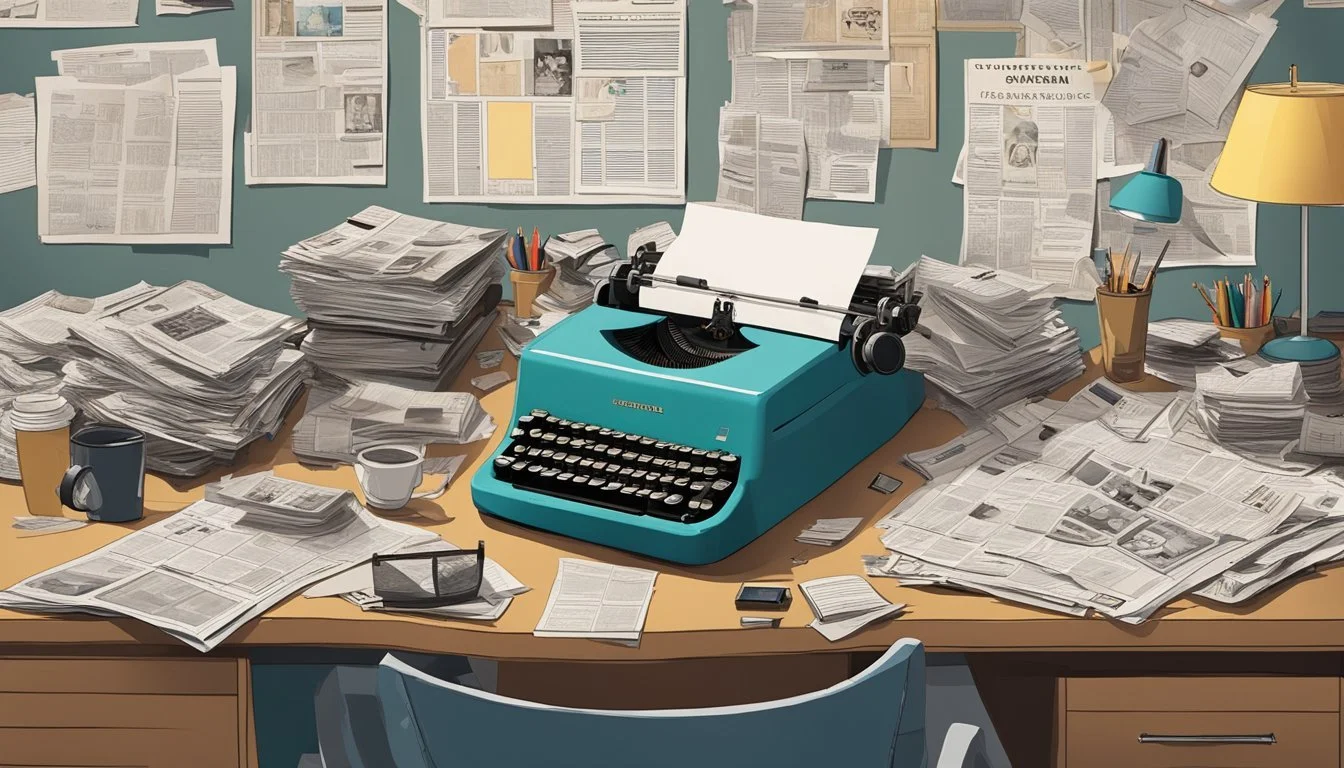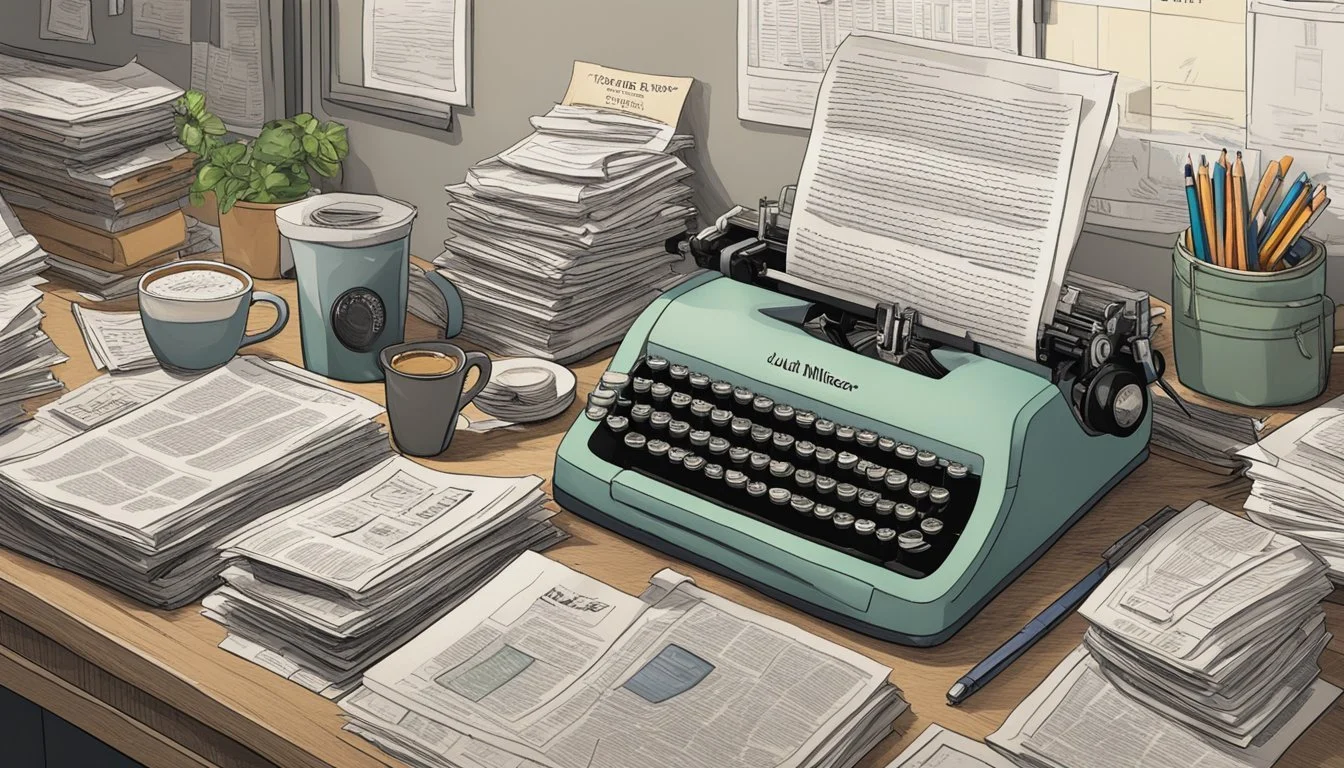Judith Miller: The Reporter at the Center of the Valerie Plame Affair
Key Figure in CIA Leak Controversy
Judith Miller, a former reporter for The New York Times, became embroiled in one of the most controversial political scandals of the early 2000s. The Valerie Plame Affair thrust Miller into the spotlight when she refused to reveal her sources in connection with the leak of a CIA operative's identity. Miller's decision to protect her sources led to her spending 85 days in jail, a move that sparked intense debate about journalistic ethics and the limits of press freedom.
Miller's notebook contained cryptic references to "Valerie Flame," a misspelling of Valerie Plame's name. This detail emerged as investigators sought to uncover who had disclosed Plame's identity as a CIA operative. The leak was widely seen as retaliation against Plame's husband, Joseph Wilson, who had publicly questioned the Bush administration's justification for the Iraq War.
The case drew significant attention to the complex relationship between journalists and their sources, particularly in matters of national security. Miller's involvement highlighted the challenges reporters face when balancing their commitment to source protection against legal obligations and public interest. Her experience reshaped discussions about shield laws and the role of journalism in a post-9/11 America.
Early Life and Career
Judith Miller's early years and professional beginnings shaped her path as a prominent journalist. Her educational background and initial career steps laid the foundation for her future work in investigative reporting and international affairs.
Educational Background
Judith Miller was born in New York City on January 2, 1948. She spent part of her childhood in Miami, Florida, where her father worked as a nightclub owner. Miller later moved to Los Angeles with her family.
She attended Ohio State University for her undergraduate studies. Miller then pursued graduate education at Princeton University's Woodrow Wilson School of Public and International Affairs. There, she earned her master's degree in public affairs.
Career Beginnings
Miller's journalism career started in the early 1970s. She secured a position at The Progressive magazine, where she honed her reporting skills. In 1977, Miller joined The New York Times as a reporter.
At The Times, she quickly established herself in the Washington Bureau. Miller covered national security issues and foreign affairs. Her work often focused on the Middle East, a region she had developed an interest in during her time in Cairo as a college student.
Miller's early assignments at The Times set the stage for her later investigative work. She gained a reputation for tackling complex international stories and cultivating high-level sources in government and intelligence circles.
Notable Work at The New York Times
Judith Miller's career at The New York Times spanned over two decades, during which she gained prominence for her reporting on Middle Eastern affairs and national security issues. Her work often focused on controversial topics and sparked intense debate.
Coverage of Middle-East Affairs
Miller established herself as a leading voice on Middle Eastern politics and conflicts. She reported extensively on Iraq, including Saddam Hussein's regime and its alleged weapons programs. Her articles explored the complexities of the region's geopolitics and the challenges faced by various countries.
Miller's reporting on Iraq's suspected biological weapons program gained significant attention. She wrote numerous articles citing unnamed sources who claimed Iraq possessed WMDs. These reports later came under scrutiny when no such weapons were found after the 2003 invasion.
Her work on Middle Eastern affairs earned her both praise and criticism. Some lauded her ability to obtain exclusive information, while others questioned the accuracy of her sources and reporting methods.
Involvement in National Security Reporting
Miller's focus on national security issues placed her at the center of high-profile stories. She covered terrorism, intelligence operations, and the aftermath of the 9/11 attacks. Her articles often relied on confidential sources within government agencies.
In 2002 and 2003, Miller wrote a series of articles about Iraq's alleged WMD program. These pieces played a role in shaping public opinion and political discourse leading up to the Iraq War. The controversy surrounding these reports later led to intense scrutiny of Miller's journalistic practices.
Miller's involvement in the Valerie Plame affair brought her work under further examination. She spent 85 days in jail for refusing to reveal a source in the case, highlighting the tensions between journalism and national security concerns.
Role in the Valerie Plame Affair
Judith Miller became a central figure in the Valerie Plame affair, a political scandal that unfolded in 2003. Her involvement sparked debates about journalistic ethics and source protection.
Initial Involvement
Miller's role began after former U.S. diplomat Joseph Wilson wrote an op-ed questioning the Bush administration's claims about Iraq's weapons program. Shortly after, Valerie Plame, Wilson's wife and a CIA operative, was publicly identified.
Miller had conversations with government officials about Plame, though she never published an article on the subject. Her notes contained the name "Valerie Flame," a misspelling of Plame's name. This suggested Miller had discussed Plame with her sources.
The revelation of Plame's identity triggered a federal investigation to determine who leaked the information.
Legal Challenges and Incarceration
Special Prosecutor Patrick Fitzgerald subpoenaed Miller to testify about her sources. She refused, citing journalistic privilege to protect confidential sources. This led to her being held in contempt of court.
Miller spent 85 days in jail for refusing to reveal her sources. Her incarceration became a symbol of journalistic integrity and the lengths reporters would go to protect their sources.
She was released after her source, Lewis Libby, gave her permission to testify.
Impact on Journalistic Confidentiality
The Plame affair raised significant questions about the limits of journalistic confidentiality. Miller's case highlighted the tension between a free press and national security concerns.
Her imprisonment sparked debates about shield laws to protect journalists from being forced to reveal sources. Some viewed her as a champion of press freedom, while others criticized her for potentially obstructing a federal investigation.
The case set a precedent for how similar situations might be handled in the future, influencing both journalists and government officials in their interactions.
Judicial Proceedings
Judith Miller's involvement in the Valerie Plame affair led to significant legal proceedings. She faced a grand jury subpoena, interacted with key figures in the investigation, and ultimately revealed confidential sources.
Grand Jury Testimony
Miller received a subpoena to testify before a grand jury in the Plame investigation. She initially refused, citing journalistic privilege to protect her sources. This decision resulted in her being held in contempt of court. Miller spent 85 days in jail for her refusal to testify.
On September 29, 2005, Miller was released from prison after agreeing to testify. She appeared before the grand jury on September 30 and October 12, 2005. Her testimony focused on her conversations with Lewis "Scooter" Libby, Vice President Dick Cheney's chief of staff.
Interactions with Lewis 'Scooter' Libby
Miller's interactions with Libby became a central focus of the investigation. She met with Libby on June 23 and July 8, 2003, discussing Iraq's weapons programs. In her grand jury testimony, Miller stated that Libby had told her about Valerie Plame's work in weapons of mass destruction at the CIA.
Miller's notes from these meetings became crucial evidence. They contained references to "Valerie Flame" and "Victoria Wilson," believed to be misspellings of Valerie Plame Wilson's name. These notes suggested that Libby had disclosed Plame's identity to Miller before it was publicly known.
Revelation of Confidential Sources
After her release from prison, Miller revealed that her primary source was Lewis Libby. She stated that Libby had given her a personal waiver to testify about their conversations. This revelation came after months of legal battles and Miller's imprisonment.
Miller's decision to disclose Libby as her source was controversial. Some praised her for eventually cooperating with the investigation, while others criticized her for not revealing the source sooner. The revelation led to Libby's indictment on charges of perjury, obstruction of justice, and making false statements.
Aftermath and Controversies
The Valerie Plame affair sparked intense debate about journalistic ethics and government transparency. It raised questions about the relationship between reporters and their sources, as well as the limits of confidentiality.
Media and Public Reaction
Judith Miller's involvement in the case drew significant media attention. Her decision to go to jail rather than reveal her source was praised by some as a principled stand for press freedom. Others criticized her for potentially obstructing justice.
Public opinion was divided. Many saw Miller as a martyr for journalistic integrity. Some viewed her as complicit in a government leak designed to discredit a critic of the Iraq War.
The controversy reignited discussions about the role of anonymous sources in journalism. It highlighted the tension between protecting sources and serving the public interest.
Analysis of Reportage and Ethical Considerations
Miller's reporting on Iraq's weapons program came under scrutiny. Critics argued that her pre-war articles, relying heavily on anonymous sources, had been too credulous of administration claims.
Journalists debated the ethics of Miller's close relationship with Lewis Libby, Vice President Cheney's chief of staff. Some felt it compromised her objectivity.
The case raised questions about:
When reporters should agree to confidentiality
How to balance source protection with legal obligations
The dangers of becoming too close to powerful sources
These issues continue to be debated in newsrooms and journalism schools today.
Life Beyond The New York Times
After leaving The New York Times, Judith Miller pursued new endeavors in writing and media. She reflected on her career and controversies through a memoir while also exploring fresh professional opportunities.
Memoir and Reflections
Miller published her memoir "The Story: A Reporter's Journey" in April 2015. The book provided her perspective on the Iraq War reporting and the Valerie Plame affair. She addressed criticisms of her work and defended her journalistic practices.
Miller discussed the notebook entry "Valerie Flame," which became central to the CIA leak investigation. She explained her decision to protect sources and her 85-day imprisonment for contempt of court.
The memoir sparked debate among journalists and critics. Some praised Miller's candor, while others questioned her account of events.
Subsequent Career Developments
Following her departure from The New York Times in 2005, Miller transitioned to new roles in media and policy. She became a contributing writer for The Wall Street Journal's opinion pages.
Miller joined the Manhattan Institute as an adjunct fellow, focusing on national security and foreign policy issues. She appeared as a commentator on Fox News, discussing terrorism and Middle East affairs.
Her expertise led to speaking engagements at universities and think tanks. Miller continued writing on topics related to national security, authoring books on bioterrorism and other threats.
Influence and Legacy
Judith Miller's involvement in the Valerie Plame affair had far-reaching consequences for journalism and national security reporting. Her actions sparked debates about journalistic ethics and the balance between protecting sources and serving the public interest.
Impact on Journalism
Miller's case highlighted the tension between journalists and government officials. Her 85-day imprisonment for refusing to reveal her sources became a rallying point for press freedom advocates. The incident led to increased scrutiny of reporter-source relationships and confidentiality agreements.
Many news organizations reviewed their policies on anonymous sources after the controversy. Some outlets implemented stricter guidelines for granting anonymity. The case also prompted discussions about journalists' responsibilities when reporting on national security matters.
Key Contributions and Criticisms
Miller's career as an investigative reporter earned her accolades, including a Pulitzer Prize for her work on al-Qaeda before 9/11. She was known for her extensive network of sources in intelligence and national security circles.
Critics accused Miller of being too credulous of government sources, particularly in her reporting on Iraq's alleged weapons of mass destruction. Her articles were later seen as contributing to the justification for the Iraq War.
The CIA leak case damaged Miller's reputation. Some colleagues criticized her for protecting sources who may have been involved in exposing an undercover CIA officer. Her decision to testify after reaching an agreement with her source was seen as controversial by some journalists.
Broader Context
The Valerie Plame affair highlighted complex relationships between government officials, the media, and national security interests. It raised questions about press freedoms, the protection of classified information, and the use of anonymous sources in journalism.
Media's Role in National Security
Journalists play a crucial role in informing the public about government activities, including those related to national security. In the Plame case, reporters became entangled in a political controversy with serious implications. The affair demonstrated the delicate balance between the public's right to know and the need to protect sensitive information.
News organizations faced difficult decisions about publishing potentially classified details. Some argued that revealing Plame's identity served the public interest by exposing government misconduct. Critics countered that such disclosures could endanger intelligence operations and personnel.
The incident sparked debate over journalistic ethics and the use of confidential sources. Many questioned whether reporters should agree to protect the identities of officials who leak classified information for political purposes.
Government and Press Interactions
The Plame affair strained relations between the Bush Administration and the media. White House officials were accused of using selective leaks to discredit a critic, while journalists faced pressure to reveal their sources.
Vice President Dick Cheney's office came under scrutiny for its alleged role in the leak. The incident highlighted tensions between the executive branch's desire to control information and the press's watchdog function.
Law enforcement investigations into the leak put reporters in the difficult position of potentially facing jail time to protect their sources. This raised concerns about press freedoms and the ability of journalists to report on government activities.
The affair led to calls for clearer guidelines on handling classified information and communicating with the media. It underscored the need for both government officials and journalists to carefully consider the potential consequences of their actions in matters of national security.




